The right IT managers are fundamental in bridging the gap between business goals and technology solutions. They ensure that the IT infrastructure not only supports but enhances the overall business strategy.
IT management requires a blend of technical skills and soft skills. Technical expertise might include knowledge of network architecture, database management, and cybersecurity, while key soft skills encompass leadership, strategic planning, and effective communication.
Candidates can write these abilities in their resumes, but you can’t verify them without on-the-job IT Manager skill tests.
In this post, we will explore 9 essential IT Manager skills, 11 secondary skills and how to assess them so you can make informed hiring decisions.
Table of contents
9 fundamental IT Manager skills and traits
The best skills for IT Managers include Project Management, Technical Expertise, Cybersecurity Knowledge, Budget Management, Vendor Management, Problem-Solving, Communication, Strategic Planning and Change Management.
Let’s dive into the details by examining the 9 essential skills of a IT Manager.
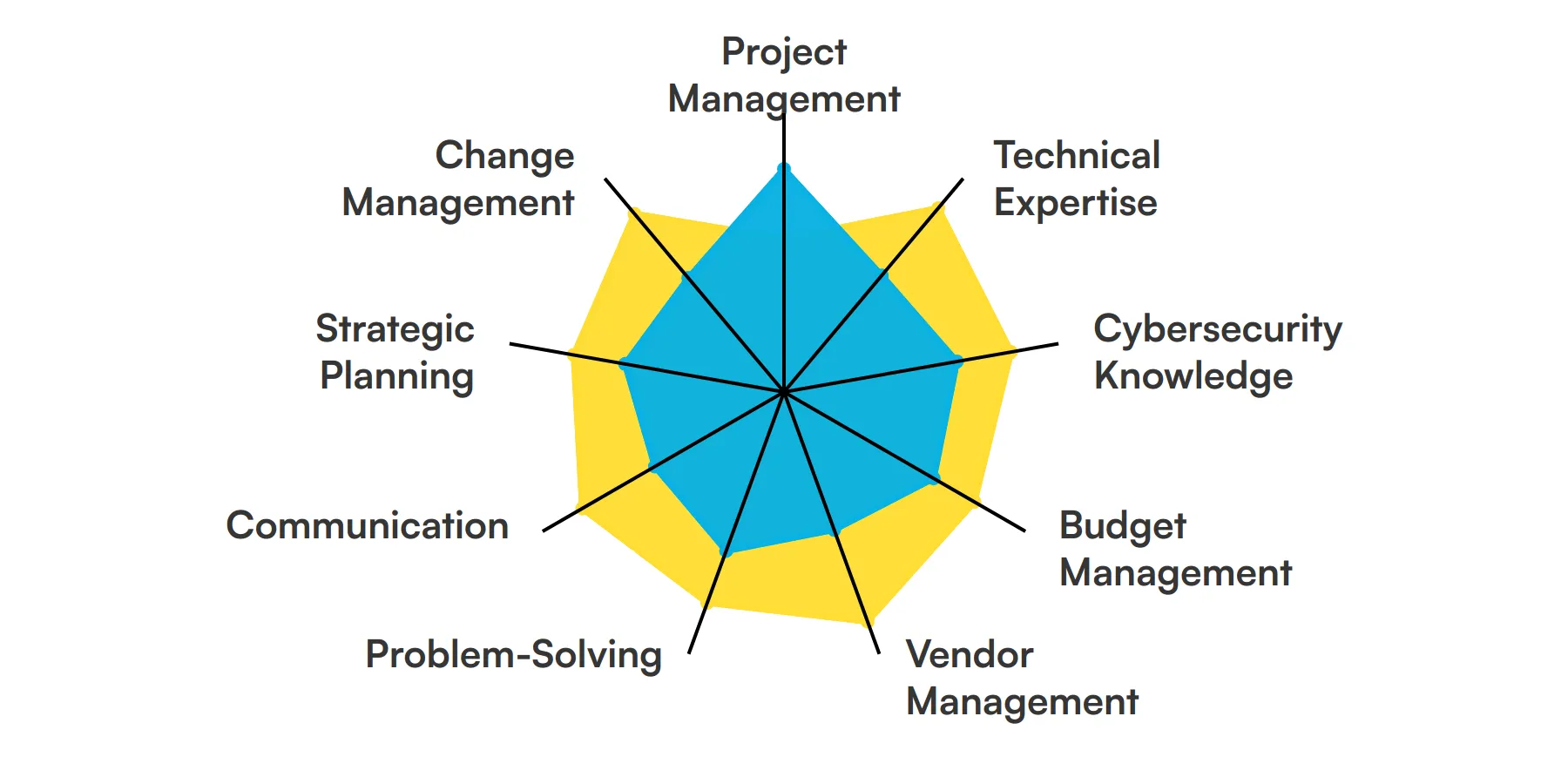
Project Management
An IT Manager must excel in project management to oversee multiple projects, ensuring they are completed on time and within budget. This skill helps in coordinating resources, setting timelines, and managing stakeholder expectations.
For more insights, check out our guide to writing a Project Manager Job Description.
Technical Expertise
Having a deep understanding of IT systems, software, and hardware is crucial. This allows the IT Manager to make informed decisions, troubleshoot issues, and guide the technical team effectively.
Cybersecurity Knowledge
In today's digital age, protecting company data is paramount. An IT Manager must be well-versed in cybersecurity practices to implement robust security measures and respond to potential threats.
Check out our guide for a comprehensive list of interview questions.
Budget Management
Managing the IT budget involves planning and allocating resources efficiently. This skill ensures that the IT department operates within its financial means while still achieving its goals.
Vendor Management
IT Managers often work with external vendors for software, hardware, and services. Effective vendor management ensures that the company gets the best value and maintains strong relationships with suppliers.
Problem-Solving
IT Managers need to be adept at identifying issues and finding solutions quickly. This skill is essential for minimizing downtime and keeping systems running smoothly.
Communication
Clear communication is key for an IT Manager to convey technical information to non-technical stakeholders, collaborate with team members, and provide updates on project progress.
For more insights, check out our guide to writing a Communications Manager Job Description.
Strategic Planning
An IT Manager must be able to align IT initiatives with the company's overall strategy. This involves long-term planning and anticipating future technology needs.
Change Management
Implementing new technologies or processes can be disruptive. An IT Manager must manage change effectively, ensuring smooth transitions and user adoption.
11 secondary IT Manager skills and traits
The best skills for IT Managers include Cloud Computing, Data Analysis, Network Management, Software Development, ITIL Framework, Disaster Recovery, Compliance, User Training, DevOps, Virtualization and Mobile Device Management.
Let’s dive into the details by examining the 11 secondary skills of a IT Manager.
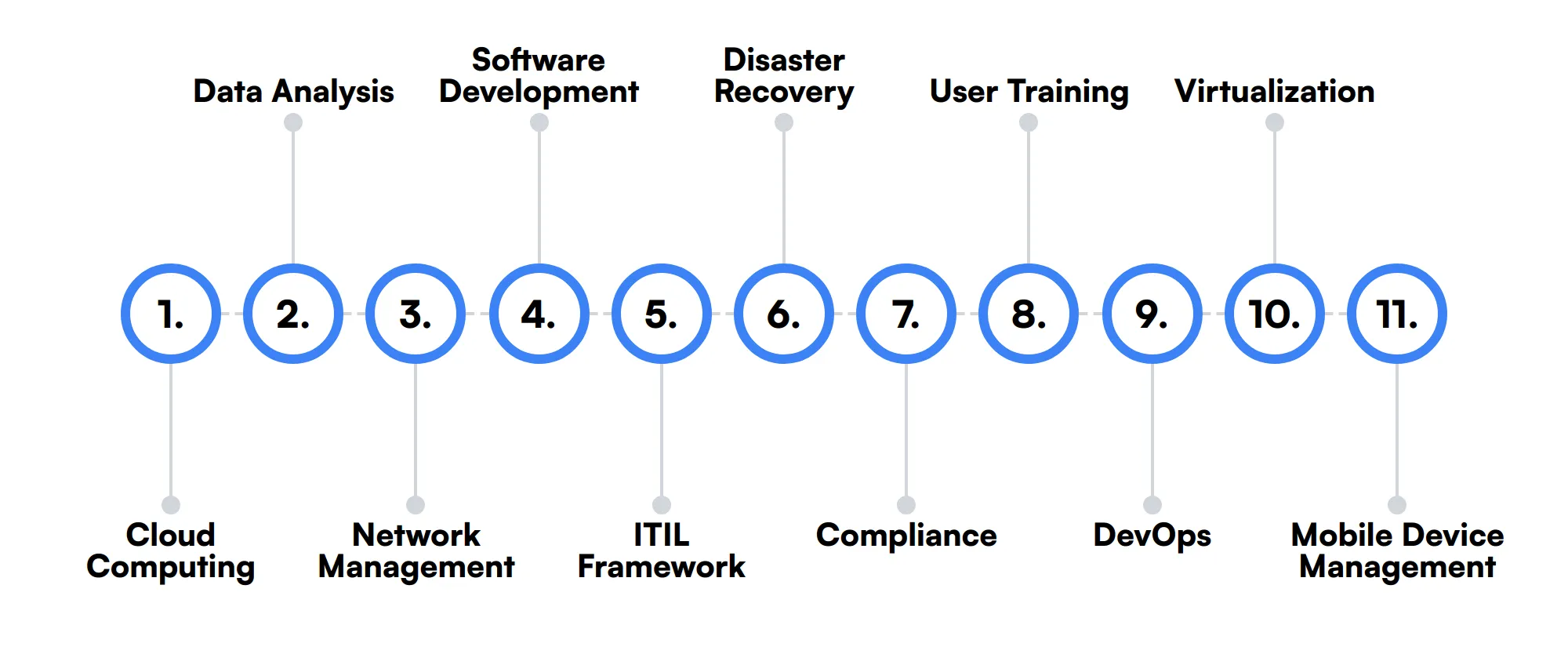
Cloud Computing
Understanding cloud services and how to leverage them can provide flexibility and scalability for the company's IT infrastructure.
Data Analysis
Being able to analyze data helps in making informed decisions and identifying trends that can improve IT operations.
Network Management
Knowledge of network infrastructure is important for maintaining connectivity and ensuring the smooth operation of IT systems.
Software Development
Familiarity with software development processes can help in managing development projects and understanding the needs of the development team.
ITIL Framework
Understanding ITIL (Information Technology Infrastructure Library) can help in implementing best practices for IT service management.
Disaster Recovery
Planning for disaster recovery ensures that the company can quickly recover from unexpected events and minimize data loss.
Compliance
Ensuring that the company's IT practices comply with relevant laws and regulations is crucial for avoiding legal issues and maintaining trust.
User Training
Providing training to users on new systems and technologies helps in maximizing the effectiveness of IT investments.
DevOps
Understanding DevOps practices can improve collaboration between development and operations teams, leading to faster and more reliable software delivery.
Virtualization
Knowledge of virtualization technologies can help in optimizing the use of hardware resources and improving system efficiency.
Mobile Device Management
Managing mobile devices is important for ensuring security and productivity in a mobile workforce.
How to assess IT Manager skills and traits
Assessing the skills and traits of an IT Manager can be a challenging task, given the diverse range of responsibilities they handle. From project management to strategic planning, an IT Manager must possess a blend of technical and soft skills to effectively lead their team and drive organizational success.
Traditional resumes and interviews often fall short in providing a comprehensive view of a candidate's capabilities. Skills-based assessments offer a more reliable way to evaluate an IT Manager's competencies. These assessments can help you understand their proficiency in key areas such as technical expertise, cybersecurity knowledge, budget management, and more.
For a more streamlined and accurate evaluation process, consider using Adaface assessments. These tests can help you achieve 2x improved quality of hires and an 85% reduction in screening time. By leveraging such tools, you can ensure that your next IT Manager is well-equipped to handle the complexities of the role.
Let’s look at how to assess IT Manager skills with these 4 talent assessments.
Project Management Test
Our Project Management Test assesses a candidate's ability to plan projects from conception to implementation, map timelines, assess risks, allocate budgets, execute the project life-cycle in a phase-wise manner, manage stakeholders, debug issues and deliver a product or service.
The test evaluates skills such as cost and budget estimation, situational judgement, understanding of key project roles and stages, and designing a project plan. Candidates are also tested on their ability to resolve issues and handle changes, manage and control resources, and prioritize tasks in real-time.
Successful candidates demonstrate a strong grasp of both agile project management and Scrum as well as traditional (waterfall) project management. They also show proficiency in risk analysis and creating and analyzing project reports.
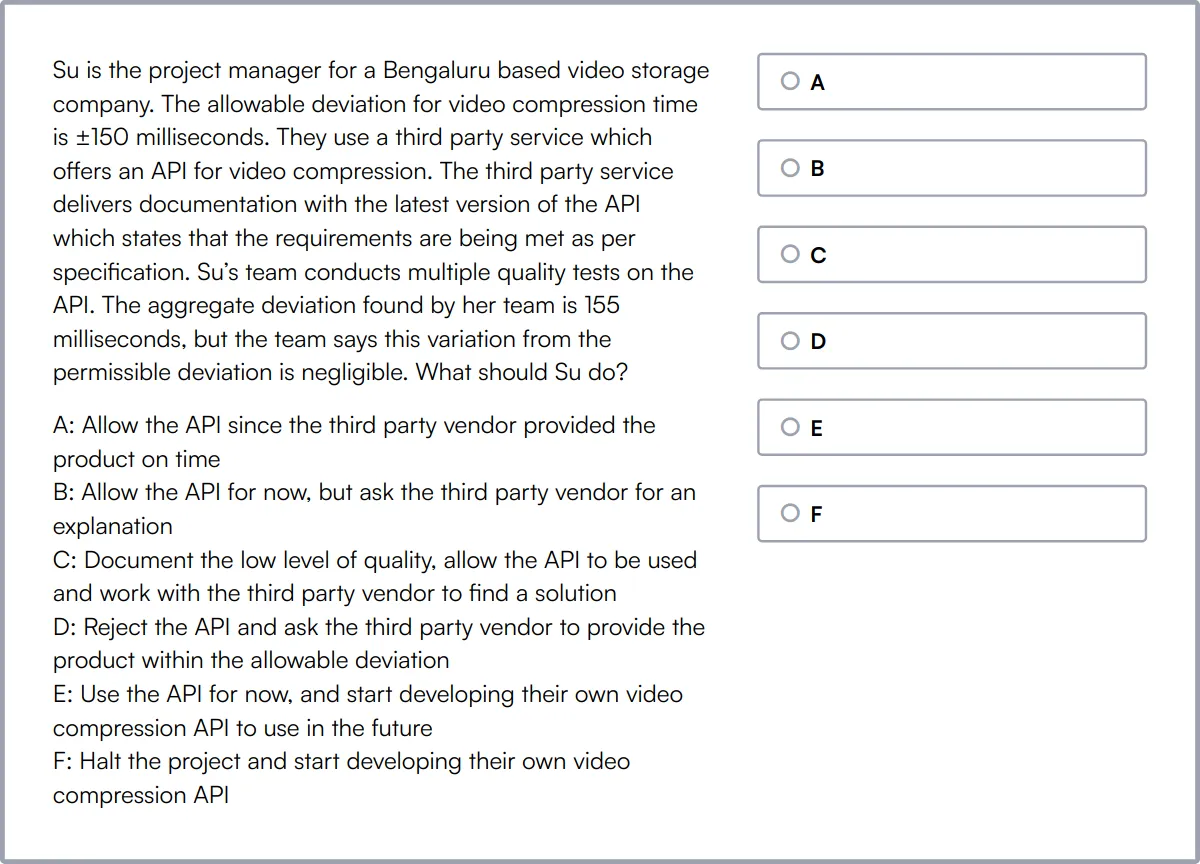
Technical Aptitude Test
Our Technical Aptitude Test uses scenario-based multiple-choice questions to evaluate a candidate's general technical aptitude and problem-solving skills.
The test covers topics such as basic computer concepts, programming fundamentals, data structures, time complexity, database management, networking and security, system administration, web development, and software engineering. Candidates are also evaluated on their ability to apply critical thinking, logical reasoning, and analytical skills to solve complex technical problems.
High-scoring candidates demonstrate a solid understanding of programming fundamentals, data structures, and algorithm basics. They also show proficiency in technical aptitude and problem-solving.
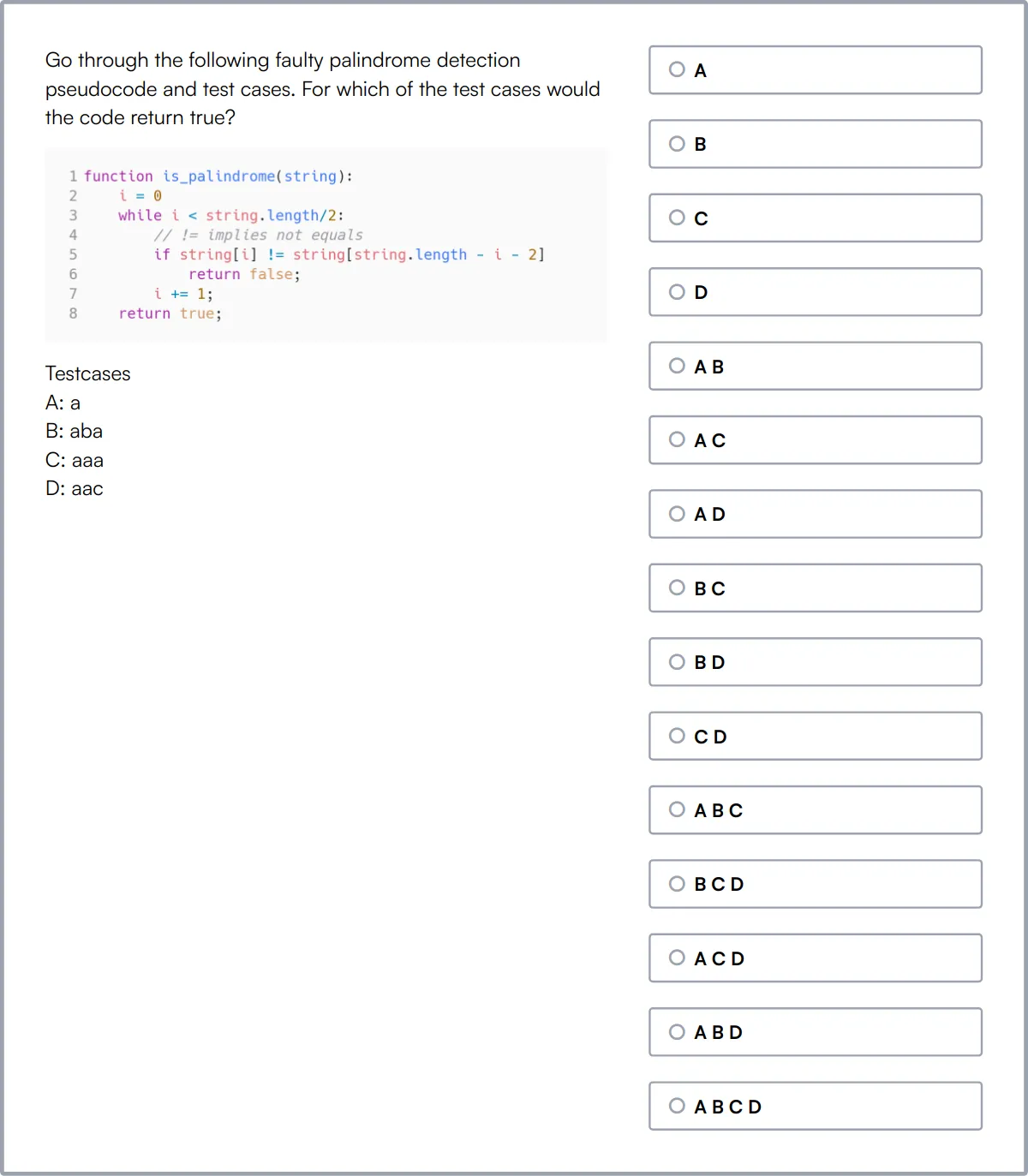
Problem Solving Test
Our Problem Solving Test evaluates a candidate's ability to understand instructions, analyze data, and respond to complex problems or situations.
The test covers skills such as abstract reasoning, critical thinking, deductive reasoning, inductive reasoning, pattern matching, and spatial reasoning. The questions are designed to get insights into their problem solving, learning agility, and coachability.
High-scoring candidates demonstrate strong logical reasoning, data interpretation, and critical thinking skills. They also show proficiency in spatial and abstract reasoning.
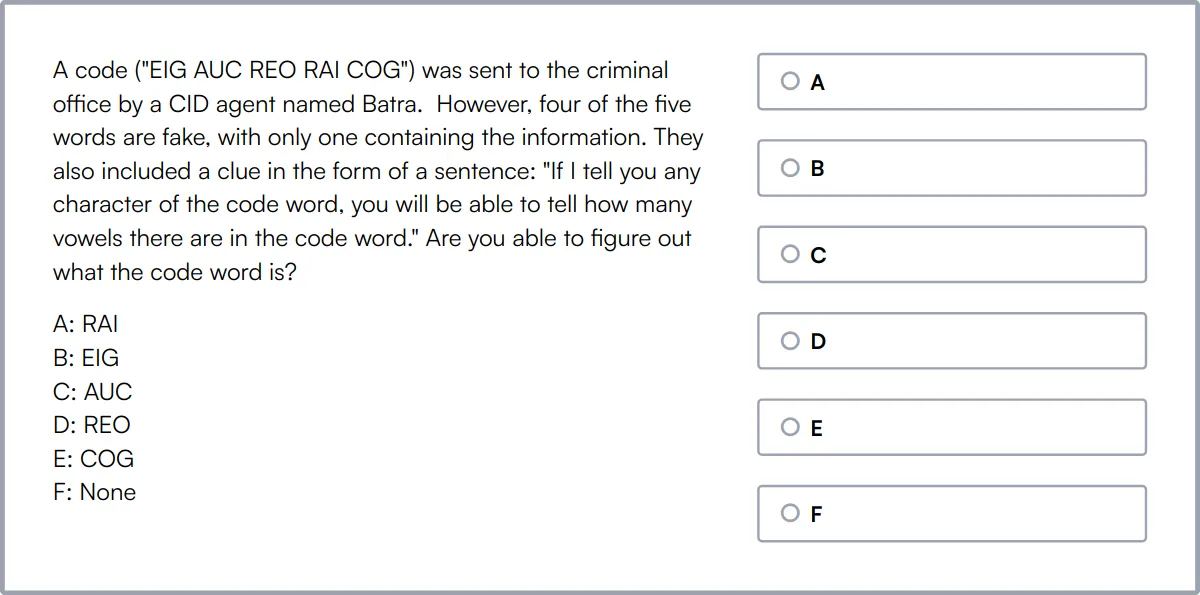
Communication Skills Test
Our Communication Skills Test evaluates candidates' communication skills, including verbal and written communication, active listening, and interpersonal skills.
The test covers areas such as communication skills, situational judgement, attention to detail, critical thinking, and verbal reasoning. It is designed to assess their ability to effectively communicate with customers, colleagues, and stakeholders in various professional scenarios.
Successful candidates demonstrate strong verbal and written communication skills. They also show proficiency in situational judgement and critical thinking.
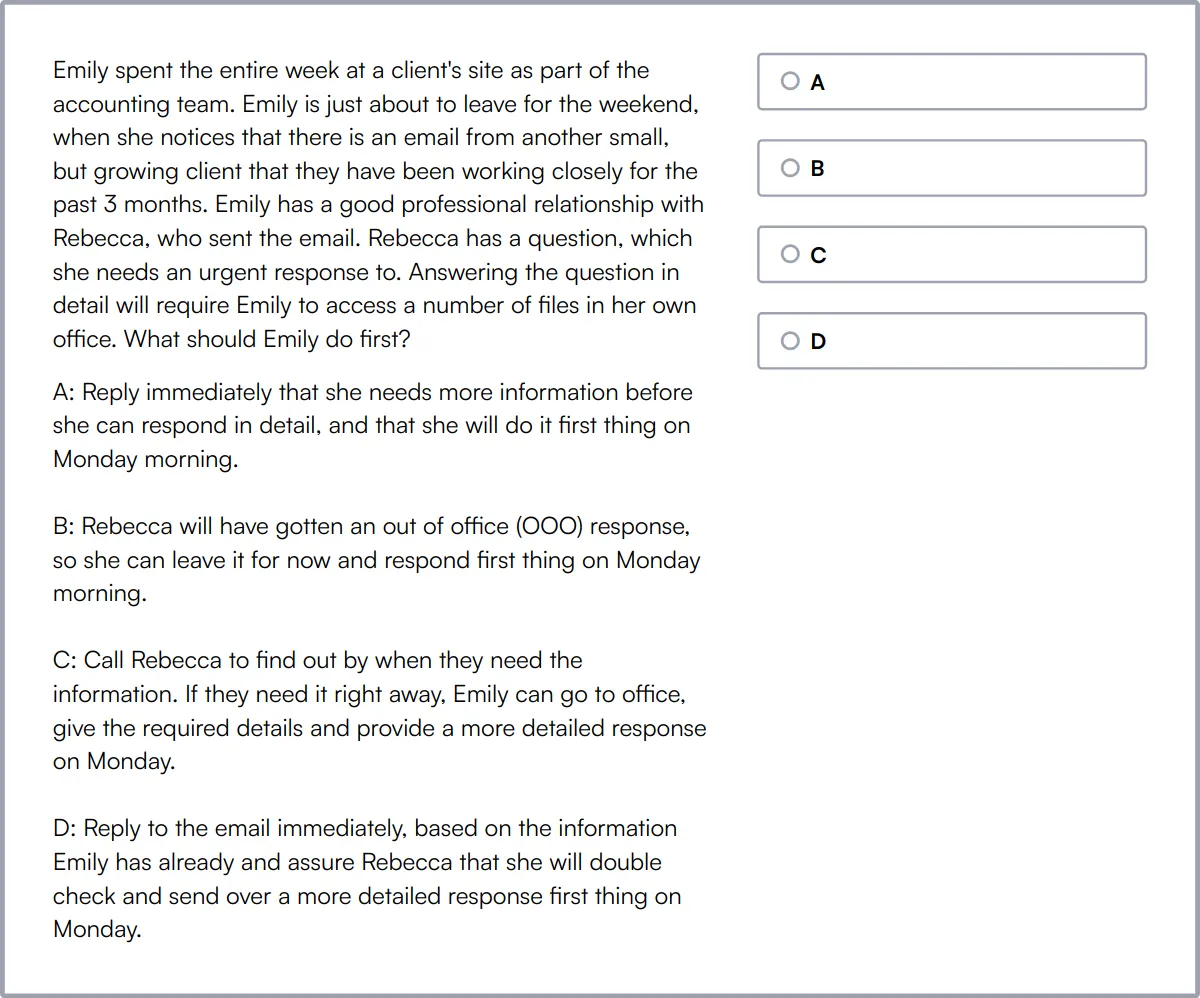
Summary: The 9 key IT Manager skills and how to test for them
| IT Manager skill | How to assess them |
|---|---|
| 1. Project Management | Evaluate ability to plan, execute, and finalize projects within deadlines. |
| 2. Technical Expertise | Assess understanding and application of specific technical skills and knowledge. |
| 3. Cybersecurity Knowledge | Test awareness of security protocols and ability to implement them. |
| 4. Budget Management | Review skills in planning, allocating, and optimizing financial resources. |
| 5. Vendor Management | Check capability to select, manage, and negotiate with external suppliers. |
| 6. Problem-Solving | Observe how effectively and creatively they resolve complex issues. |
| 7. Communication | Judge clarity, effectiveness, and adaptability of verbal and written communication. |
| 8. Strategic Planning | Assess ability to formulate, implement, and evaluate strategic decisions. |
| 9. Change Management | Evaluate how well they manage, adapt to, and lead change. |
Jenkins & Ansible Online Test
IT Manager skills FAQs
What are the key project management skills for an IT Manager?
Key project management skills include planning, scheduling, resource allocation, risk management, and stakeholder communication. Proficiency in project management tools like Jira or Trello is also beneficial.
How can I assess an IT Manager's technical expertise?
Assess technical expertise through technical interviews, coding tests, and reviewing past projects. Certifications in relevant technologies can also be a good indicator.
Why is cybersecurity knowledge important for an IT Manager?
Cybersecurity knowledge helps in protecting the organization's data and systems from threats. It includes understanding firewalls, encryption, and compliance with security standards.
What methods can be used to evaluate an IT Manager's budget management skills?
Evaluate budget management skills by reviewing past budget reports, discussing financial strategies during interviews, and checking for experience with financial software.
How do you assess an IT Manager's vendor management capabilities?
Assess vendor management by asking about past vendor relationships, negotiation experiences, and their approach to contract management and performance evaluation.
What problem-solving skills should an IT Manager possess?
An IT Manager should be able to identify issues, analyze root causes, and implement effective solutions. Scenario-based questions during interviews can help assess these skills.
How important is communication for an IT Manager?
Communication is crucial for coordinating with teams, stakeholders, and vendors. Assess this skill through behavioral interviews and by checking references.
What strategic planning skills are necessary for an IT Manager?
Strategic planning involves setting long-term goals, aligning IT initiatives with business objectives, and resource planning. Discussing past strategic projects can help assess these skills.

40 min skill tests.
No trick questions.
Accurate shortlisting.
We make it easy for you to find the best candidates in your pipeline with a 40 min skills test.
Try for freeRelated posts
Free resources



